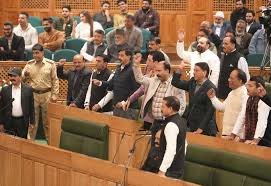Srinagar, October 28, 2025 : The Jammu and Kashmir Assembly on Tuesday witnessed an intense debate as the House rejected a private member’s bill moved by PDP MLA Waheed Para seeking to grant proprietary rights to individuals who have constructed houses on government land. Chief Minister Omar Abdullah firmly opposed the proposal, cautioning that such a move would “open floodgates for land grab” across the Union Territory.
The bill titled “A Bill to Provide Special Provisions for Residents of UT of J&K for Recognizing the Proprietary Rights of Houses Constructed on State Land, Kacharia Land, Common Land, and Shamilat Land” sought to secure ownership or transfer rights to those occupying such lands under the ambit of the right to shelter guaranteed by Article 21 of the Constitution.
However, the government opposed the motion, urging Para to withdraw it. “On the surface, it looks easy — if someone has constructed a house on government land, give the land to him. But last time, under the Roshni Scheme, when the pre-militancy clause was removed, it led to widespread controversy, and we failed to defend it in court,” Omar Abdullah said, referencing the controversial land regularisation programme that was later scrapped.
He warned that the present bill, which lacked a cut-off date, would go “beyond the Roshni scheme” and incentivize further encroachments. “We already have provisions under PMAY for the landless. This proposal cannot be accepted,” the Chief Minister stated, appealing to the member to withdraw the bill.
In his defence, PDP MLA Waheed Para argued that while the government claims to provide land to the landless and housing to the houseless, it must also protect those already residing on such lands. “This is not an isolated issue; it affects thousands across Jammu and Kashmir. The government must live up to Sheikh Abdullah’s legacy of justice and equality,” he said.
Omar Abdullah retorted sharply, saying, “Land to the tiller was about empowering farmers, not regularizing land grabbers. There’s a huge difference between land reform and land encroachment. I won’t support such a bill — not even for my relatives.”
Following heated exchanges, Speaker Abdul Rahim Rather put the bill to vote. With only three members supporting it, the motion was defeated by voice vote, marking the end of the contentious debate.
The government reiterated its commitment to addressing genuine landless cases through legal and transparent means under existing welfare schemes while rejecting any blanket regularisation of encroachments.



















